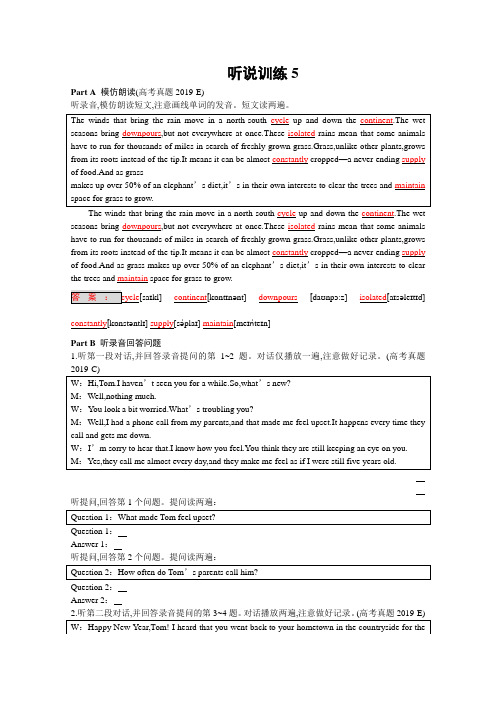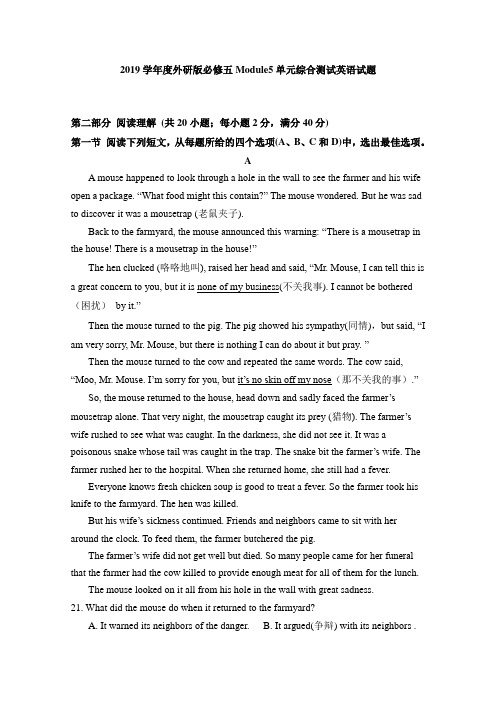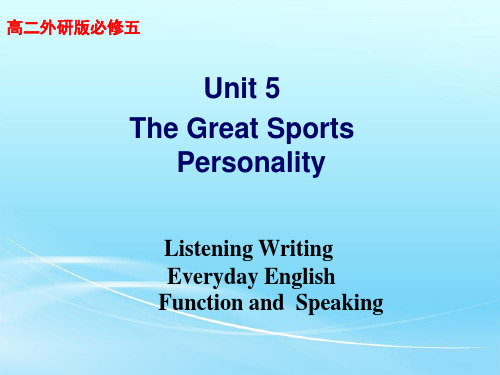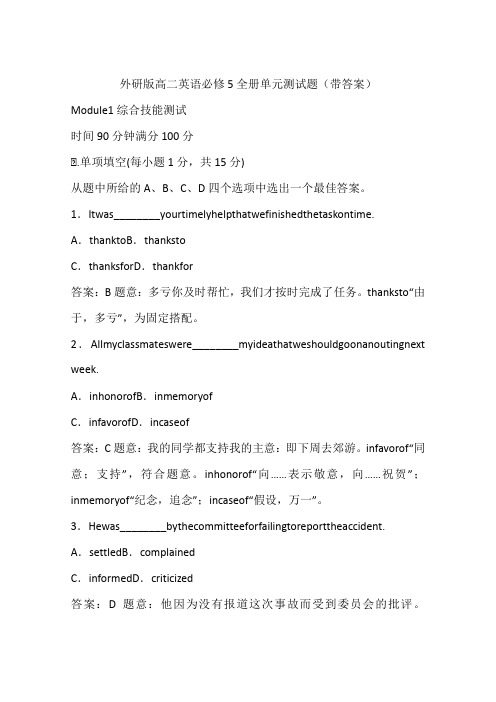2019学年高二年级英语听说训练:10(外研版必修5)
- 格式:doc
- 大小:65.50 KB
- 文档页数:3

听说训练5Part A模仿朗读(高考真题2019-E)听录音,模仿朗读短文,注意画线单词的发音。
短文读两遍。
The winds that bring the rain move in a north-south cycle up and down the continent.The wet seasons bring downpours,but not everywhere at once.These isolated rains mean that some animals have to run for thousands of miles in search of freshly grown grass.Grass,unlike other plants,grows from its roots instead of the tip.It means it can be almost constantly cropped—a never-ending supply of food.And as grass makes up over 50% of an elephant’s diet,it’s in their own interests to clear the trees and maintain space for grass to grow.s a I kl] continent[kɒnt I nənt] downpours[d aʊnpɔːz] isolated[a I səle I t I d]constantly[kɒnstəntl I] supply[sə̍p la I] maintain[me I n̍t e I n]Part B听录音回答问题1.听第一段对话,并回答录音提问的第1~2题。
对话仅播放一遍,注意做好记录。
(高考真题2019-C)听提问,回答第1个问题。
提问读两遍:Question 1:Answer 1:听提问,回答第2个问题。

2019学年度外研版必修五Module5单元综合测试英语试题第二部分阅读理解(共20小题;每小题2分,满分40分)第一节阅读下列短文,从每题所给的四个选项(A、B、C和D)中,选出最佳选项。
AA mouse happened to look through a hole in the wall to see the farmer and his wife open a package. “What food might this contain?” The mouse wondered. But he was sad to discover it was a mousetrap (老鼠夹子).Back to the farmyard, the mouse announced this warning: “There is a mousetrap in the house! There is a mousetrap in the house!”The hen clucked (咯咯地叫), raised her head and said, “Mr. Mouse, I can tell this is a great concern to you, but it is none of my business(不关我事). I cannot be bothered (困扰)by it.”Then the mouse turned to the pig. The pig showed his sympathy(同情),but said, “I am very sorry, Mr. Mouse, but there is nothing I can do about it but pray. ”Then the mouse turned to the cow and repeated the same words. The cow said, “Moo, Mr. Mouse. I’m sorry for you, but it’s no skin off my nose(那不关我的事).”So, the mouse returned to the house, head down and sadly faced the farmer’s mousetrap alone. That very night, the mousetrap caught its prey (猎物). The farmer’s wife rushed to see what was caught. In the darkness, she did not see it. It was a poisonous snake whose tail was caught in the trap. The snake bit the farmer’s wife. The farmer rushed her to the hospital. When she returned home, she still had a fever.Everyone knows fresh chicken soup is good to treat a fever. So the farmer took his knife to the farmyard. The hen was killed.But his wife’s sickness continued. Friends and neighbors came to sit wit h her around the clock. To feed them, the farmer butchered the pig.The farmer’s wife did not get well but died. So many people came for her funeral that the farmer had the cow killed to provide enough meat for all of them for the lunch.The mouse looked on it all from his hole in the wall with great sadness.21. What did the mouse do when it returned to the farmyard?A. It warned its neighbors of the danger.B. It argued(争辩) with its neighbors .C. It had a warm talk with its friends.D. It tried hard to cheer its friends.22. Which of the following is mentioned in the story?A. The farmer was bitten by a snake.B. The neighbors came for chicken soup.C. The pig expressed its sympathy(同情)for the mouse.D. The hen was sure that it’ll be both ered by mousetrap.23. Which of the following can best express the moral (寓意) of the story?A. Out of sight, out of mind.B. Mind works faster in time of danger.C. Never put your nose into others’ business.D. We should get together in time of trouble.24. How does the author develop the passage(这篇文章是以什么顺序展开的)?A. By argument.B. By time.C. By discussion.D. By space.BMany students in China are learning English. Some of these students are small children. Others are teenagers(十几岁的青少年). Many are adults. Some learn at school, others study by themselves. A few learn English language (语言)over the radio, on television, or in films. One must work hard to learn another language.Why do all these people want to learn English? It is difficult to answer that question. Many boys and girls in China learn English at school because it is one of their subjects. They study their own language and maths and English ... Some people learn English because it is useful for their work. Many people often learn English for their higher studies, because at college or university(大学) some of their books are in English. Other people learn English because they want to read newspaper and magazines in English.25. Many students in China are learning English, aren't they? ____.A. No, they aren'tB. No, they areC. Yes, they areD. Yes, they aren't26. If one wants to learn another language well, he must ____.A. learn at schoolB. study by himselfC. work hardD. study hardly27. "Their own language" means ____.A. ChineseB. EnglishC. FrenchD. JapaneseCOnce upon a time, there lived a rich man. He had a servant (仆人). He and the servant loved wine and good food very much. Each time the rich man left his home, the servant would drink the wine and eat up all the nice food in the house. The rich man knew what his servant did, but he had never caught his servant doing that.One morning, when he left home, he said to the servant, “Here are two bottles of poison (毒药) and some nice food in the house. You must take of them.” With these words, he went out.But the servant knew that the rich man had said was untrue. After the rich man was away from his home, he enjoyed a nice meal. Because he drank too much, he was drunk and fell to the ground. When the rich man came back, he couldn’t find his food and his wine. He became very angry. He woke the servant up. But the servant told his story very well. He said :“a cat had eaten up everything. I was afraid to be punished(惩罚), so I drank the poison to kill myself.”28.In the story, _______ liked wine and good food very much.A. the rich manB. the servantC. both A and BD. neither A and B29.In fact, it was _______ that drank the wine and ate up all the nice food.A. the catB. himselfC. nobodyD. the servant30.The rich told the servant that there was poison in the two bottles, because ________.A. there was in fact poison in the bottlesB. did not want the servant to drink his wineC. he wanted to kill the catD. he wanted to kill the servant31.From the story, we know that the servant is very _______.A. lazyB. badC. cleverD. kindDYou are watching a film in which two men are having a fight. They hit one another hard. At the start they only fight with their fists. But soon they begin hitting one another over the heads with chairs. And so it goes on until one of the men crashes(撞击)through a window and falls thirty feet to the ground below. He is dead!Of course he isn't reallydead. With any luck he isn't even hurt. Why?Because the men who fall out of high window or jump from fast moving trains,who crash cars or even catch fire,are professionals(专业人士). They do this for a living. These men are called stuntmen(替身演员). That is to say,they perform tricks. There are two sides to their work. They actually do most of the things you see on the screen. For example,they fall from a high building. However,they do not fall on to hard ground but on to empty cardboard boxes covered with a mattress(床垫).Again,when they hit one another with chairs,the chairs are made of wood and when they crash through windows,the glass is made of sugar!But although their work depends on trick of this sort,it also requires a high degree of skill and training.Often a stuntman's success depends on careful timing. For example,when he is“blown up”in a battle scene,he has to jump out of the way of the explosion just at the right moment.Naturally stuntmen are well paid for their work,but they lead dangerous lives. They often get seriously injured,and sometimes killed. A Norwegian stuntman,for example,skied over the edge of a cliff(悬崖) a thousand feet high. His parachute(降落伞)failed to open,and he was killed. In spite of(尽管) all the risks,this is no longer a profession for men only. Men no longer dress up as women when actresses have to perform some dangerous action. For nowadays there are stunt girls(女替身) too!32.The stuntmen are those who________.A.often dress up as actorsB.prefer to lead dangerous livesC.often perform seemingly dangerous actionsD.often fight each other for their lives33.The stuntmen earn their living by________.A.playing their dirty tricks B.selling their special skillsC.jumping out of high windows D.jumping from fast moving trains 34.When a stuntman falls from a high building,________.A.he needs little protection B.he will be covered with a mattressC.his life is endangered D.his safety is generally all right35.What can be inferred from the author's example of the Norwegian stuntman?A.Sometimes an accident can occur to a stuntman.B.The percentage of serious accidents is high.C.Parachutes must be of good quality.D.The cliff is too high.第二节(共5小题;每小题2分,满分10分)根据短文内容,从短文后的选项中选出能填入空白处的最佳选项,并在答题卡上将该项涂黑。

综合能力测试五(必修5)第Ⅰ卷(选择题)第一部分听力(共两节,满分30分)第一节(共5小题;每小题1.5分,满分7.5分)听下面5段对话。
每段对话后有一个小题,从题中所给的A、B、C三个选项中选出最佳选项,并标在试卷的相应位置。
听完每段对话后,你都有10秒钟的时间来回答有关小题和阅读下一小题。
每段对话仅读一遍。
答案1-5CABBA6-10CBACB11-15CAABC16-20 CABACText 1W:Jack, how do you like the play?M:It's a simple story with a happy ending, but, luckily, they had a very strong actor, he managed to carry the whole play.Text 2M:Have we missed it? The man said it's only five blocks away opposite the bank.W:Wait a minute, the Chinese restaurant, the national bank, there it is, the Radisson Hotel.Text 3M:Let's meet at 20 to 5.W:Well. Could we make it 20 past 5?M:That's a bit late for me. I could manage 10 past.W:OK. See you then.Text 4M:What time are we leaving for the outing?W:I'll phone you tomorrow. I should have everything sorted out by then.Text 5W:Thanks for all you've done for me. Hey, listen, would you like to go to see a film sometime?M:Yeah, that'd be great. I'd love it.Text 6W:Hey, where is everybody?M:They took Ben to the park. Where have you been?W:Sorry, I'm late. I picked up the cake and it took me longer than I expected. When will the party start?M:Ben invited eight children from school. And they'll arrive at about 2 in the afternoon.W:OK. Then I'll put the candles on the cake and leave it in the kitchen and then I'll come and help set the table.Text 7M:So, Macy, how was your holiday?W:Oh, we loved it. Tom liked Germany best, but France was my favorite.M:So did Rachael finally go with you?W:No, she wasn't able to. She was called away for a business trip to China.M:That's a pity. So where exactly did you go and visit?W:Well, we traveled all over, Italy, Spain and Holland; we even bathed in a Swiss lake.M:You did, really?Text 8W:Bob, I'm sure you know about second-hand smoke.M:Of course, I do.W:But have you heard about third-hand smoke?M:Third-hand smoke? I'm afraid not. What is that then?W:Well, it is here in today's paper. Parents may think they are protecting children from second-hand smoke when they smoke outside their home or only when the children are not there. But now researchers are warning about what they call third-hand smoke. When you smoke dangerous matter from cigarettes get into your hair and clothing. As babies are the weakest, when you come to a baby, you pass it to the baby and increase the chances of disease in the baby.M:Is that so? In that case I have to say that I should never get close to a baby.W:That's right. Actually all smoking parents should do the same or better give it up completely.Text 9M:Hello, welcome to our program “Today City”. I'm Larry. We're going to Louisville Kentucky where our guest Michelle Ray comes from. She is proud of her middle-sized city with a small town feel and big city dreams. Now, Michelle, tell us about your city.W:Thank you, Larry. Here is my city. Louisville is my city. The first place I take visitors from out of town is to the Highlands for shopping and night life. When I have delicious Asian food I always go to the Zen Garden which provides wonderful all vegetable dishes.M:Wow, that's interesting. Many people go for healthy food now.W:You can say that again. If I want to go camping and fishing, I go to the Red River area. For complete quiet I can hide away in my house with a good book from one of our public libraries.M:That all sounds very exciting. I'm sure some of our listeners will include Louisville in their travel plan for their next holiday. Thank you, Michelle.Text 10M:We are glad to have Dr. Garfield to talk to us today about dreams. Let me start by asking the first question. Does everyone dream?W:It appears that everyone does. Mostly when people say that they never dream, what they really mean is that they don't remember their dreams or they don't think their dreams are important. The reason behind is that they might have been made fun of with a child when they first reported their dreams or it was so frightening that they just turned off dreaming completely. The other day, someone named Davis came to me and said that he used to be a great dreamer, but suddenly he stopped having dreams. I asked him what it happened. It turned out that his brother died by heart attack and he never expected that such a terrible thing would happen to a young person. Generally, when there was some frightening event and dream about it was too terrible. People prefer not to dream about it. Actually the worst thing you can do is stop dreaming. Because it means that the bad experience would be too painful to even appear in dreams. As long as you dream about it and even the dream is frightening, your mind is working on it. My personal opinion about what dreams do is that they help us deal with our problems. We see certain patterns take place in dreams. When a person is hurt deep inside, when a person is seriously ill or when a person has been really sad, if people turn off their dreams totally, it means they don't love themselves to even thinkabout it.第二部分阅读理解(共两节,满分40分)第一节(共15小题;每小题2分,满分30分)阅读下列短文,从每题所给的四个选项(A、B、C和D)中,选出最佳选项。


外研版高二英语必修5全册单元测试题(带答案)Module1综合技能测试时间90分钟满分100分Ⅰ.单项填空(每小题1分,共15分)从题中所给的A、B、C、D四个选项中选出一个最佳答案。
1.Itwas________yourtimelyhelpthatwefinishedthetaskontime. A.thanktoB.thankstoC.thanksforD.thankfor答案:B题意:多亏你及时帮忙,我们才按时完成了任务。
thanksto“由于,多亏”,为固定搭配。
2.Allmyclassmateswere________myideathatweshouldgoonanoutingnext week.A.inhonorofB.inmemoryofC.infavorofD.incaseof答案:C题意:我的同学都支持我的主意:即下周去郊游。
infavorof“同意;支持”,符合题意。
inhonorof“向……表示敬意,向……祝贺”;inmemoryof“纪念,追念”;incaseof“假设,万一”。
3.Hewas________bythecommitteeforfailingtoreporttheaccident. A.settledB.complainedC.informedD.criticized答案:D题意:他因为没有报道这次事故而受到委员会的批评。
criticize“批评”,符合题意。
settle“解决,驻扎”;complain“埋怨”;inform“通知”。
4.Theinstructionsonthebottlearereally________.Ican'tunderstandthemat all.A.encouragedB.variousC.confusingD.standard答案:C题意:瓶子上的说明非常难懂,我根本不理解。
confusing“令人困惑的”,符合题意。

2019-2020年高二10月月考英语试题(必修5)第一部分听力(共两节,满分20分)第一节(共5小题;每小题1分,满分5分)听下面5段对话。
每段对话后有一个小题,从题中所给的A、B、C三个选项中选出最佳选项,并标在试卷的相应位置。
听完每段对话后,你都有10秒钟的时间来回答有关小题和阅读下一小题。
每段对话仅读一遍。
1. What’s John’s address?A. 1434 King Street.B. 1344 Queen Street.C. 1343 King Street.2. What does the man suggest to the woman?A. Giving up reading.B. Skimming through the books.C. Reading the books thoroughly.3. What does Mary like to do?A. Chat with her friends on line.B. Do shopping through Internet.C. Talk with her friends over the phone.4. What does the woman mean?A. They were very tired.B. They were badly dressed.C. Their rackets were worn out.5. What does the woman think the man needs for the work?A. Experience.B. Good luck.C. Educational background.第二节(共15小题;每小题1分,满分15分)听下面5段对话或独白。
每段对话或独白后有几个小题,从题中所给的A、B、C三个选项中选出最佳选项,并标在试卷的相应位置。
听每段对话或独白前,你将有时间阅读各个小题,每小题5秒钟;听完后,各小题将给出5秒钟的作答时间。
高中英语学习材料***鼎尚图文理制作***高二英语十月份月考试题命题人:岳小锋第一部分听力(共两小节,满分20分)第一节(共5小题,每小题1分)听下面5段对话。
每段对话后有一个小题,从题中所给的A、B、C三个选项中选出最佳选项,并标在试卷的相应位置。
听完每段对话后,你都有10秒钟的时间来回答有关小题和阅读下一小题。
每段对话仅读一遍。
1.Why can’t the woman go to the west coast?A.She will start a new a job.B. She has to take another training.C. She is busy with her new job.2.Where does this conversation take place?A. At a storeB. At an officeC. At a hospital3. What information about the man can be obtained from the conversation?A. He feels uneasyB. He had an operation not long ago.C. He is in the hospital.4. What did the man have for lunch?A. Steak and ham.B. ChickenC. Fish5. At what time does the second show start?A.7;00B. 7:45C. 9:45第二节(共15小题,每小题1分)听下面五段对话或独白.每段对话或独白后有几个小题,从题中所给的A、B、C三个选项中选出最佳选项,并标在试卷的相应位置.听每段对话或独白前,你将有时间阅读各个小题,每小题5秒钟;听完后,各小题将给出5秒钟的作答时间.每每段对话或独白读两遍.听第6段材料。
高中英语学习材料***鼎尚图文理制作***2014—2015学年江口淮阳中学高二期末英语试题(听力)第Ⅰ卷第一部分听力(共两节,满分30分)第一节(共5小题;每小题1.5分,满分7.5分)听下面5段对话。
每段对话后有一个小题,从题中所给的A、B、C 三个选项中选出最佳选项,并在答题卡上将该项涂黑。
听完对话后,你都有10秒钟的时间来回答有关小题和阅读下一小题。
每段对话仅读一遍。
1. What are the speakers talking about?A. A red light.B. A running race.C. A traffic accident.2. How should the woman pay?A.In cash.B.By cheque.C.By credit card.3. What does the woman mean ?A She’s learned a lot from the literature class.B She’s wr itten some books about world classics.C She’s met some of the world’s best writers.4. What are the speakers mainly talking about?A The man’s libraryB The woman’s CD collectionC The woman’s music store5. How does the man feel?A SatisfiedB ConfidentC Unsure第二节(共15小题;每小题1.5分,满分22.5分)听下面5段材料。
每段材料读两遍。
听第6段对话,回答6---7题。
6.How do Americans usually call each other in a company?A By the last nameB By the first nameC By the full name7. What does the man dislike about working in the US?A The short holidayB The low salariesC The informal clothes听第7对话,回答8---10题。
模块检测·提升五本试卷分第Ⅰ卷和第Ⅱ卷两部分,满分150分。
考试用时120分钟。
第Ⅰ卷(共115分)第一部分听力(共两节,满分30分)第一节(共5小题;每小题1.5分,满分7.5分)听下面5段对话。
每段对话后有一个小题,从题中所给的A、B、C三个选项中选出最佳选项,并标在试卷的相应位置。
听完每段对话后,你都有10秒钟的时间来回答有关小题和阅读下一小题。
每段对话仅读一遍。
W:Oh,what a beautiful city!I'm really glad I brought my camera.M:There're lots of things to take pictures of here.But I hope you won't plan to spend all your time taking pictures.I have some friends here who would like to see you.1What does the man want the woman to do?A.Visit more places in the city.B.Take some pictures of his friends.C.Spare some time to meet his friends.W:Look,the leaves on the trees have turned red and yellow.M:Yeah!Before long there will be snow on the ground.2What season is it now?A.Spring.B.Autumn. C.Winter.M:Excuse me,could you please tell me how to get to the nearest bank?W:Sure.Go straight for two blocks,turn left,and walk three more blocks until you get to the drugstore.It's right across the street.M:Thanks a lot.3How far will the man have to walk to get to the nearest bank?A.Two blocks. B.Three blocks. C.Five blocks.W:Is there anything I can do for you?M:Please buy some cigarettes for me while you're at the drugstore.W:I'm not going there.I'm going to see Aunt Mary,but I'll get some for you at the supermarket.4Where will the woman get cigarettes for the man?A.At the supermarket.B.At the drugstore.C.At her aunt's.W:My mother will not agree to my having a friendship with our neighbor,John.M:Why?W:She says that John often tells lies,and she's worried that I may become dishonest if I make friends with him.5What do we know from the conversation?A.The woman is dishonest.B.The man and John are good friends.C.The woman's mother has a low opinion of John.第二节(共15小题;每小题1.5分,满分22.5分)听下面5段对话或独白。
Module 5综合技能测试时间90分钟满分100分I .单项填空(每小题1分,共15分)从题中所给的A、B、C、D四个选项中选出一个最佳答案。
1.you have been to Mount Tai, you can*t imagine how beautiful it is.A.UnlessB. BecauseC. AlthoughD. When答案:A题意:除非你去过泰山,否则你永远不可能想象到它有多美! unless相当于if not,引导条件状语从句。
2.In his speech, the headmaster there would be a new librarybuilt in two years* time.A. establishedB. decidedC. appliedD. declared答案:D题意:在讲话中,校长宣布两年后将要建成一所新图书馆。
declare u宣布”,符合题意。
establish "建立,创立";decide "决定”;apply "申请” o3.—We'd better hurry up; we'll be late.―? Do you really want to listen to the boring lecture?A. What forB. Or whatC. What nextD. So what答案:D题意:"——我们最好快点,否则会迟到的。
” “——那又怎么样呢?你还真想听那枯燥的演讲吗? " so what “那又怎么样呢?", 符合语境。
4.Perseverance is a kind of and thafs what it takes to doanything well.A. qualityB. temperC. talentD. appearance答案:A 题意:毅力是一种品质,是做好任何事情所需要的。
听说训练10
Part A模仿朗读(高考真题2019-F)
听录音,模仿朗读短文,注意画线单词的发音。
短文读两遍。
Out of all of Britain’s cities,there’s one that stands alone,London.But how London came to look the way it does can also be seen from above.Because 60 years ago,the Royal Air Force photographed the whole of London from end to end,and left us a unique record of a city torn apart by war.Now exactly the same process is being repeated.And by directly comparing London then with London now,we can tell the story of the greatest transformation in the city’s history.It’s a transformation that continues faster now than at any time since the war.
b r I tənz] photographed[fəʊtə raːfd]
unique [jʊ̍n iːk] record[r I kɔːd;(for n.)rekɔːd] torn [tɔːn] process[p rəʊses] comparing[kəm peər I ]
transformation[t rænsfə̍m e Iʃn]
Part B听录音回答问题
1.听第一段对话,并回答录音提问的第1~2题。
对话仅播放一遍,注意做好记录。
听提问,回答第1个问题。
提问读两遍:
Question 1:
Answer 1:
听提问,回答第2个问题。
提问读两遍:
Question 2:
Answer 2:
2.听第二段对话,并回答录音提问的第3~4题。
对话播放两遍,注意做好记录。
(高考真题2019-E)
听提问,回答第3个问题。
提问读两遍:
Question 3:
Answer 3:
听提问,回答第4个问题。
提问读两遍:
Question 4:
:
:What class did Dr.Brown just have?
Answer 1:A history class.
Question 2:What is the woman’s report about?
Answer 2:Wearing school uniforms.
2.Question 3:What’s new on campus this Saturday?
Answer 3:There’s a job fair./There will be a job fair.
Question 4:What is the woman going to do after she gets the degree?
Answer 4:Work in a law firm.
Part C故事复述(高考真题2019-F)
关键词:spill(使……洒出,泼出) coffee stain(咖啡污渍) wash off(洗去,洗掉) flower(花) element(成分)
(一)听第一遍,速记以下要点:
1.夹克衫被弄脏?
2.谁弄脏?
3.怎样处理衬衫?
4.意外发现?
(二)听第二遍,速记以下细节,并做好复述准备:
Tom
One Sunday morning,
But Mary,
The next day,
So
Finally
(三)复述故事
根据速记的内容口头复述故事。
Part D问题翻译(高考真题2019-F)
1.你怎么看待穿校服?
2.穿同样的衣服不烦吗?
3.你小时候穿校服吗?
uniforms?/What’s your opinion about wearing school uniforms?
2.Isn’t it boring to wear the same clothes?/Isn’t wearing the same clothes boring?/Don’t you feel bored to wear the same clothes?
3.Did you wear school uniforms when you were young?/Did you wear school uniforms when you were a kid?/Did you wear school uniforms when you were a child?。